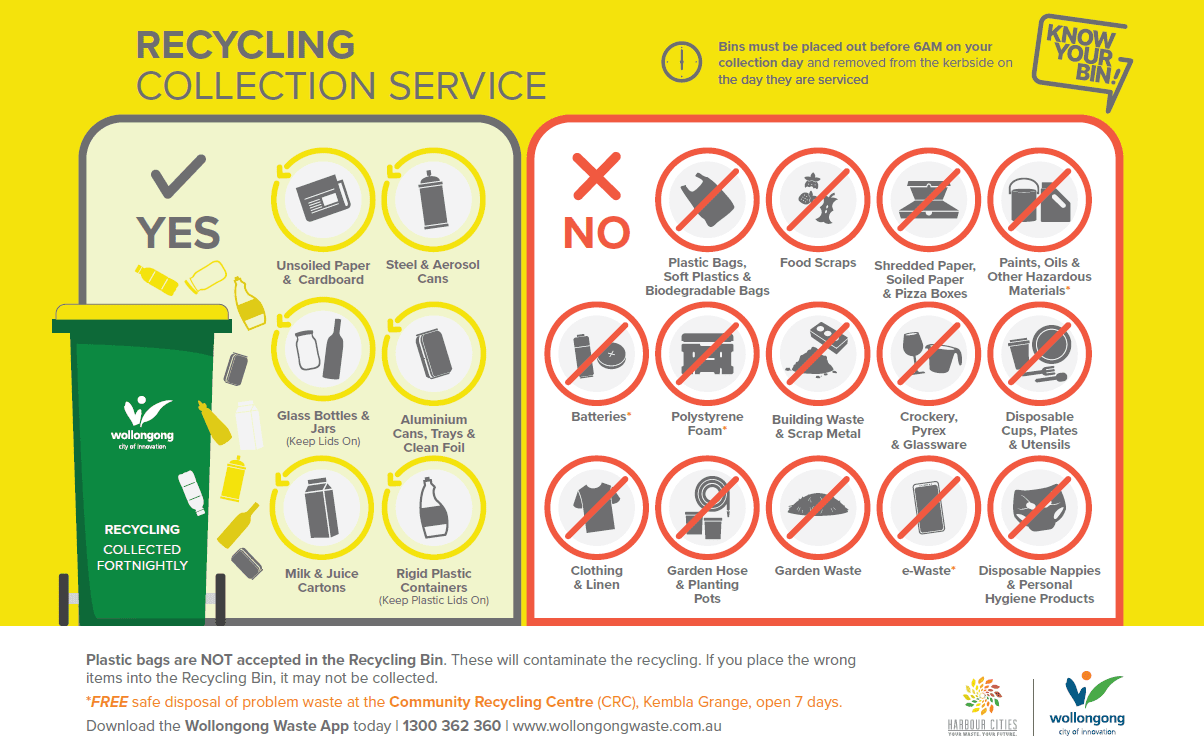As we are in National Recycling Week, it’s the perfect time to reflect on how we manage our waste at home and in our communities. Recycling is something most of us are familiar with but doing it right can make much a bigger impact than you might realise.
Here’s everything you need to know about recycling right – and how you can take simple steps today to help reduce waste, save resources and support a cleaner Wollongong
What Can Be Recycled in Your Yellow Bin
In Wollongong the yellow bin is used for household recyclables, here’s what should always go in:
✅ Unsoiled Paper & Cardboard
✅ Steel & Aerosol Cans (Aerosol Cans need to be emptied)
✅ Glass Bottles & Jars (Keep Lids On)
✅ Aluminium Cans, Trays & Clean Foil
✅ Rigid Plastic Containers (Keep Plastic Lids On)
What Should Not Be In Your Yellow Bin?
Some Items that people commonly place in recycling bins can contaminate an entire load of recycling, meaning that everything may be sent to landfill instead.
❌ Soft plastic (e.g. bread bags, chip packets & glad wrap)
❌ Food Scraps or dirty containers
❌ Clothing or linen
❌ Batteries & e-waste
❌ Polystyrene foam
📍 Local Drop-Off Points for Hard-to-Recycle Items
Not everything can go in your house recycling bin – but that doesn’t mean it has to go to landfill.
Wollongong Residents have access to several local recycling options:
- Paint, Motor and other oils: Hazardous waste should be taken to the Community Recycling Centre or a chemical clean-out event.
- Batteries: B-cycle is Australia’s official battery recycling scheme. To find local drop off locations click here.
- Polystyrene: Can be taken to the Community Recycling Centre for FREE!
- Select E-wase: Can be taken to various Office Works Stores; more information on what they accept can be found here, The Community Recycling Centre also takes select E-waste (Lamp & light fittings, battery operated toys & Oil heaters will not be accepted)
💡 Tips to Improve Recycling at Home
Recycling is not just about what you throw away, it is about setting up your home in a way that makes good recycling habits second nature. Here are some simple tips:
- Set up separate bins indoors for general waste & recycling
- Label bins clearly, especially if you have young children or guests in the home
- Give containers a quick rinse before recycling, they do not need to be spotless, just free of leftover food
- Avoid bin contamination by double-checking unusual items before tossing them in
- Get the household involved — recycling works best when everyone’s on board!







